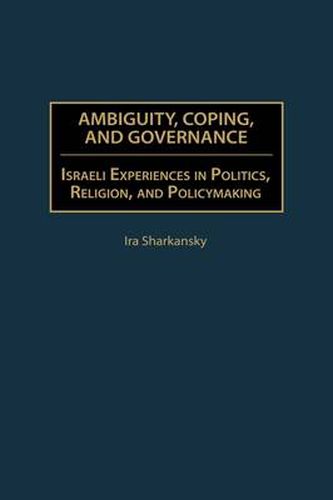Readings Newsletter
Become a Readings Member to make your shopping experience even easier.
Sign in or sign up for free!
You’re not far away from qualifying for FREE standard shipping within Australia
You’ve qualified for FREE standard shipping within Australia
The cart is loading…






Sharkansky asserts that the use of ambiguity and other forms of coping are more suitable than problem solving in dealing with certain kinds of public problems. However, there are costs as well as benefits associated with these less than perfect ways of policy making. Sharkansky’s approach conveys both optimism and pessimism. The bright side is that ambiguity works; the dark side is not so much its disadvantages as the realization that many commentators and practitioners of the craft seem unwilling to recognize its advantages and appear unwilling to promote its use for problems where it might be most useful.
Ambiguities surrounding the name of Jerusalem lead to insights and possibilities with respect to the city’s future, as well as with respect to other disputes involved in the peace process between Israel and its neighbors. Ambiguities also appear in sophisticated modes of social science, and they raise the question, if research is unclear, can policy making be substantially different? As Sharkansky makes clear, there are negative as well as positive aspects to coping and ambiguity, and he suggests ways of dealing with the disadvantages. This frontal attack on widely advocated, conventional modes of thinking about public problems and policy making will be stimulating to students, researchers, and policy makers dealing with Israeli-Arab issues specifically and policy issues generally.
$9.00 standard shipping within Australia
FREE standard shipping within Australia for orders over $100.00
Express & International shipping calculated at checkout
Sharkansky asserts that the use of ambiguity and other forms of coping are more suitable than problem solving in dealing with certain kinds of public problems. However, there are costs as well as benefits associated with these less than perfect ways of policy making. Sharkansky’s approach conveys both optimism and pessimism. The bright side is that ambiguity works; the dark side is not so much its disadvantages as the realization that many commentators and practitioners of the craft seem unwilling to recognize its advantages and appear unwilling to promote its use for problems where it might be most useful.
Ambiguities surrounding the name of Jerusalem lead to insights and possibilities with respect to the city’s future, as well as with respect to other disputes involved in the peace process between Israel and its neighbors. Ambiguities also appear in sophisticated modes of social science, and they raise the question, if research is unclear, can policy making be substantially different? As Sharkansky makes clear, there are negative as well as positive aspects to coping and ambiguity, and he suggests ways of dealing with the disadvantages. This frontal attack on widely advocated, conventional modes of thinking about public problems and policy making will be stimulating to students, researchers, and policy makers dealing with Israeli-Arab issues specifically and policy issues generally.